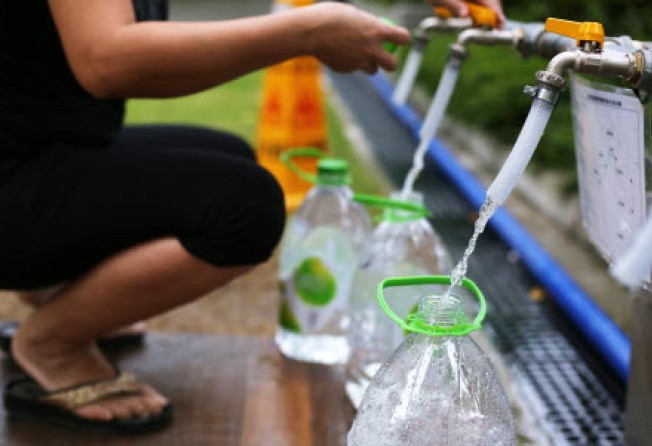Hong Kong's water scandal offers lessons on the proper roles of public and private sectors
Philip Bowring says both the lead contamination in Hong Kong's water and the BBC's declining standards underline the challenge of providing quality public goods

Holidaying in France, I had been musing over the fact that restaurant patrons now routinely ordered tap water rather than the bottled variety, which was once as ubiquitous as a pichet of wine. Was this a mark of economic austerity? Or had the French finally come to realise that free eau du robinet was just as good as Evian, Perrier, San Pellegrino, etc?
Perhaps Hong Kong people could save some money by following suit and filling their ubiquitous personal water bottles from the tap rather than fall for the Watson's distilled variety, Coca-Cola's Bonaqua or the host of more or less expensive commercial products purporting, without much evidence, to be healthier than the free stuff.
So it was quite a shock to land back in Hong Kong in the midst of a scare over lead levels in tap water in certain public housing estates. A promotional coup for the bottled water sellers, this raised the question of why the government's Water Supplies Department, which rightly devoted time and effort to ensuring that it delivered water with minimal levels of bacteria, lead and heavy metals to estates, did not apparently require management companies to ensure that it was not contaminated in the final metres of piping to the household taps.
Now there has been a flurry of activity to check public housing and Home Ownership Scheme estates. But what about the 50 per cent of housing controlled by management companies, which are mostly closely linked to the original estate developers? One is reminded that the biggest cluster of infections from the severe acute respiratory syndrome outbreak was traced to leaking waste pipes at the Amoy Gardens estate in Kowloon, developed and managed by the Hang Lung group.
So could Hong Kong's devotion to expensive bottled water be a correct response to concerns that whatever the standard of water produced by the Water Supplies Department, managements of estates could not be trusted to ensure that their pipes were delivering pristine, lead-free water?
If that is the case, it is another example of how private-sector developers are allowed to get away with potentially endangering public health and negating the efforts of the government, using taxpayers' money, to provide drinkable water.
Unless the public can become more confident that the water from their household taps is drinkable, they will continue to spend money on commercial substitutes, often from plastic bottles that themselves may deliver unwholesome chemicals to the user.
The existence of specific legal liability for managements to deliver potable water would do far more for public health than poster campaigns about mosquitoes, let alone nanny-state demands such as the "hold the handrail and don't walk" at the MTR stations, which, if obeyed, would make station over-crowding even worse.
Also on my holiday, a visit to Britain was reminder of another aspect of the correct roles of public and private sectors, in this case one with some relevance to Hong Kong. The licence-fee funded British Broadcasting Corporation (BBC) is facing political pressure to be cut down to size, resulting in squeals of outrage from its incestuous elite of overpaid performers and managers. What was once a plain public service broadcaster now has its fingers in all manner of radio, television and internet activities, many of which appear to have more to do with celebrity promotion than public service.
I cannot comment in detail on the quality of its British output, but I can on its world services. BBC World Service TV is an embarrassment, no better than CNN and inferior to Al-Jazeera and even Channel News Asia.
As for the World Service Radio, once viewed as the gold standard of global radio reporting, it now appears run by producers and editors brought up on British tabloid journalism. Its faddish interests, dumbed-down reporting and breathless "what's the latest" presenters' demands on correspondents make a mockery of the efforts of its better journalists.
One might also think that presenters were being paid for every time they gave a plug to Facebook and Twitter, urging listeners to go to their web pages rather than those of the BBC, as though the BBC itself were not a famous brand. Once the leader in public service broadcasting, BBC radio now lags well behind Australian Broadcasting Corporation and America's National Public Radio. Even our own little RTHK seems to retain standards which the BBC has lost. Quality rather than quantity or mass appeal is supposed to be the hallmark of public service broadcasting.
The BBC has been digging its own grave. So, too, have some bookshops that seem more concerned with getting paid by publishers to promote one or two titles than stimulating book-buying interest.
I noted a leading bookstore on London's Piccadilly devoting its 18-metre window display to just two books. Overhyping of a tiny selection of titles for sale results in equally deserving titles being ignored. In this case, one of the chosen volumes was Harper Lee's Go Set a Watchman, a book described by almost every review I have read as a very poor early draft of To Kill a Mockingbird.
Oh, the curse of celebrity obsession in all manner of media.
Philip Bowring is a Hong Kong-based journalist and commentator